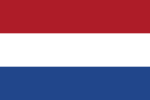Netherlands
Construction Site
This article is work in progress and not yet part of the free encyclopedia IntactiWiki.
The Netherlands, also known informally as Holland, and more properly as The Kingdom of the Netherlands. The name of the country in Dutch is Nederland. The people are the Dutch and the language spoken is also Dutch. The Kingdom of the Netherlands is a constitutional monarchy situated in Europe. It is bordered south by Belgium, east by Germany and northwest by the North Sea. The nation includes three islands in the Caribbean Sea.
The Netherlands have a population of about 18,000,000 of which about 5 percent are Muslim migrants.
The Netherlands are strong supporters of human rights.
The Netherlands, unlike the English-speaking nations, have never practiced circumcision of boys. Circumcision is rare in Holland except among ethnic minorities.
Contents
Human rights
The Netherlands Institute of Human Rights (SIM) is a part of the University of Utrecht School of Law. SIM (1998) issued a very strong statement against child circumcision.[1]
Male circumcision
A Dutch Member of Parliament, Ayaan Hirsi Ali, proposed that The Dutch Government should consider making the circumcision of boys an offence.[2]
After Ayaan Hirsi Ali asked if male circumcision could be made illegal, Justice Minister Piet Hein Donner claimed that circumcision was not traumatic and he saw no reason to make it illegal,[3] however strong evidence exists that child circumcision is traumatic.[4]
When it was learned in 2004 that Dutch Medicare was paying for religious circumcision rather than medical circumcision, the Health Ministry discontinued payments for circumcision. It was learned that 90 percent of the circumcisions covered by Dutch national health insurance was for religious circumcision rather than medical circumcision. Reportedly, about 17,000 circumcisions are carried out per year.[5]
The Royal Dutch Medical Association (KNMG) (2010) issued a very strong statement against the practice of non-therapeutic child circumcision. The statement cites the lack of any therapeutic or prophylactic value. It also takes a strong position on the human rights violations inherent in non-therapeutic circumcision of minors, including the right to self-determination and the right to physical integrity. the statement has been endorsed by seven specialty medical organisations.[6]
See also
External links
References
- ↑ Smith, Jacqueline (1998): Male Circumcision and the Rights of the Child. Work: To Baehr in Our Minds: Essays in Human Rights from the Heart of the Netherlands (SIM Special No. 21). Mielle Bulterman, Aart Hendriks and Jacqueline Smith (Eds.) (ed.). Utrecht: Netherlands Institute of Human Rights (SIM). Pp. 465-98. Retrieved 16 September 2021.
Quote:The right to physical integrity has two components: protection against violation of and offenses against the body by others, thus from outside, and the right to determine over one's own body, the right to self-determination. The right to physical integrity is one of the fundamental civil rights. It is a right to "freedom." The government should therefore refrain from interference. However, the government also has a relevant duty of care, namely the stimulation of a climate in which civil rights can achieve a substantive form.
- ↑ (4 October 2004)."Dutch MP wants ban on male circumcision", Radio Hilversum. Retrieved 17 September 2021.
Quote:The MP, who is often in the news for her controversial views on integration, says circumcision can have long-term damaging effects.
- ↑ (7 October 2004)."Justice Minister against outlawing circumcision", Radio Netherlands. Retrieved 16 September 2021.
- ↑ Taddio A, Katz J, Ilersich AL, Gideon K. Effect of neonatal circumcision on pain response during subsequent routine vaccination. Lancet. 1 March 1997; 342(9052): 599-603. PMID. DOI. Retrieved 17 September 2021.
- ↑ (17 December 2004)."Unkind cut: Dutch medicare halts coverage for male circumcision", Canadian Press. Retrieved 16 September 2021.
- ↑ Kruseman, Arie Nieuwenhuijzen: Non-therapeutic circumcision of male minors , Royal Dutch Medical Association. (27 May 2010). Retrieved 17 September 2021.
